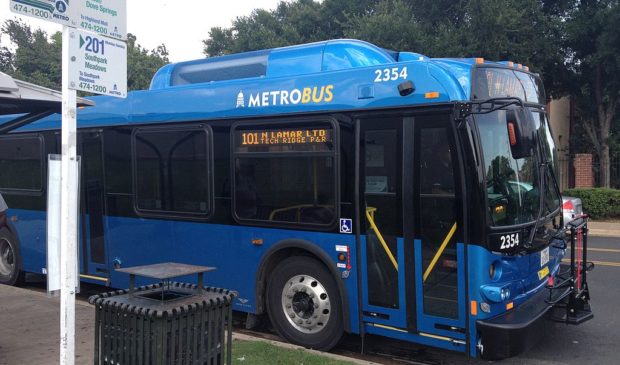Capital Metro board in favor of free rides for K-12
Friday, November 16, 2018 by
Ryan Thornton On Wednesday, Capital Metropolitan Transportation Authority board members expressed an interest in making free rides for K-12 students a permanent feature.
On June 8, the day after Capital Metro overhauled its service network with the controversial redesign known as Cap Remap, it launched a service pilot called “Summer Sun, Late Nights and Family Fun,” which expanded weekend commuter rail service hours and made rides free for kids in grades K-12. The service pilot was originally supposed to expire on Sept. 1, but at the end of August it was extended until Dec. 10.
Chair Wade Cooper said the program has symbolic importance in addition to its practical advantage to students and the community.
“It speaks well to the community about our commitment to provide valued service, particularly to kids, but also to support the educational mission we have in the community, and I can’t think of anything more important for us to do,” said Cooper.
The free fares for students program is one component of overall boosted ridership numbers seen since the Cap Remap launch in June. Capital Metro counted 100,000 free student rides during the first month of the service pilot in June and another 120,000 in July. This being the first year of counting student rides, however, there is no way to compare these numbers with previous years to determine how many rides are due to free fares. Cap Remap itself is also a confounding factor in interpreting any ridership data at this time.
As customers adjust to the new network and ridership levels even out, Capital Metro CEO Randy Clarke estimates that the loss in fares will float between $250,000 and $300,000 per year.
Clarke stressed that Capital Metro would have to find creative ways of making up the loss, saying the organization’s budget is already “tapped.” “Any external assistance from the city … could go a long way to doing not only this but maybe potentially other positive public transit benefits to the community,” said Clarke.
One solution Clarke mentioned is to place advertisements at bus stops, a strategy currently prohibited by a city advertising ordinance that doesn’t allow for advertising in the right of way.
“There’s an ordinance related to advertising and signage that needs some tweaking in order to allow for the advertisement at the bus stops,” said Council Member Ann Kitchen.
Council Member Delia Garza, who serves as vice chair of the board, agreed with Kitchen and expressed interest in exploring options for continuing the program with her colleagues at City Hall.
Cooper directed staff to draw up a resolution respectfully requesting City Council to amend its advertising ordinance in order to allow Capital Metro to advertise at bus stops to make up for the lost revenue if the new fare structure is adopted.
A separate resolution will be drafted to make the change to the fare structure permanent. Per FTA regulations, Capital Metro will make a public hearing notice of 21 days before holding a public hearing on the resolution and voting during the Dec. 5 board meeting.
This story has been corrected: The loss in fares is estimated to be $250,000 and $300,000 per year, not per month.
Photo by Jsevse made available through a Creative Commons license.
The Austin Monitor’s work is made possible by donations from the community. Though our reporting covers donors from time to time, we are careful to keep business and editorial efforts separate while maintaining transparency. A complete list of donors is available here, and our code of ethics is explained here.
You're a community leader
And we’re honored you look to us for serious, in-depth news. You know a strong community needs local and dedicated watchdog reporting. We’re here for you and that won’t change. Now will you take the powerful next step and support our nonprofit news organization?











